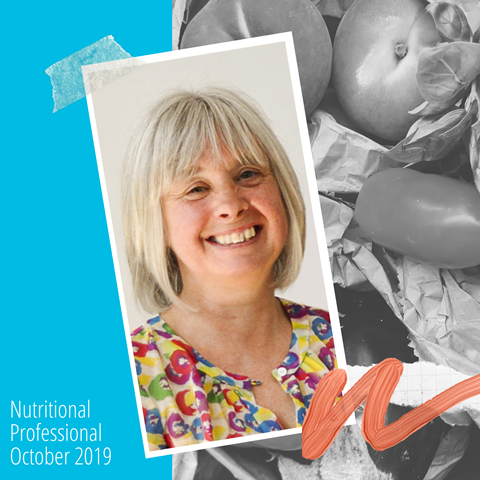Louise Edwards is a Community Team Lead Dietitian working in Cheshire. We caught up with her recently to find out more about what her job involves.
Hi Louise, thanks for joining us. Please could you tell us a bit about yourself?
I am the Community team lead dietitian within the Central Cheshire Integrated Care Partnership (CCICP). I live in Chester with my husband and 3 young daughters. I enjoy running, cooking and gardening and love being near water.
Could you talk us through your career journey to date?
I started as a band 5 rotational dietitian at my local hospital, covering oncology, cardiology, diabetes, gastroenterology, followed by a short secondment in the community team for three months in a team lead role. I then moved back to the acute setting as a Specialist Inpatient Dietitian and lead on a ‘high output stoma’ management project alongside the stoma nurses and colorectal surgeons. I learnt a lot in this post and realised my passion for service development and improving patient outcomes. In October 2018, I moved to a newly established post with the newly formed CCICP as the community team lead dietitian.
What does a typical day look like?
A typical day involves touching base with my team to check that we are likely to achieve what we have planned and to move things around, where necessary. I liaise with the acute dietitians to see if there are any pending community discharges and we discuss any community patients that are currently inpatients. I then work through my clinical caseload for the day; this may involve telephone calls and home visits. Depending on the day, I may attend an MDT meeting at one of the care communities or a medicines management meeting with the CCG.
Does your job involve multidisciplinary team working? Could you tell us more?
Yes, it does. The nature of an integrated care partnership that I work for means that MDT working is paramount. I ‘hot desk’ and as such may start the day in one of the care communities and end the day in another. At these locations I am liaising with speech and language therapists, occupational therapists, physiotherapists, complex care practitioners. Reviewing ONS prescribing means communicating regularly with the medicines management pharmacists, practice managers and GPs to ensure we are following the policy and referrals are being made to the dietitian when indicated.
Did you always intend to work in the community?
No, I did not intend to work in the community. I thoroughly enjoyed the time I spent in the acute setting, especially the MDT working. Being part of CCICP means that I am still able to enjoy MDT working in the community setting - often I am sat in the office with complex care practitioners, district nurses and other allied health professionals. I enjoy supporting my team with their development and have strived to improve the service as well as raising the profile of dietetics within the CCICP.
Could you explain what the role of a Prescribing Support Dietitian involves?
Reviewing appropriate prescribing is just an element of my role. I have been working closely with our Clinical Commissioning Groups (CCGs) to review the policy on appropriate prescribing of oral nutritional supplements. This policy supports GPs in their decision making with regards to provision of ONS and is followed by the dietitians working across 3 CCGS. As part of this policy review the community team dietitians are reviewing patients on ONS in each of the GP practices in our CCG. This ONS review entails addressing if the ONS prescription is appropriate, has the individual received food first advice and dietetic input yet? We are also seeing if prescriptions can be stopped or reduced.
How do you go about training to become a Prescribing Support Dietitian?
I have not completed any specific training - my experience in both acute and community settings has taught me a lot about appropriate prescribing. I aim to keep up to date with new oral nutritional supplements available on the market that are ACBS approved and I invite the companies to our department so we can taste test the products. I am also a member of the BDA Prescribing Support Specialist Group.
What are the biggest challenges you face as a Prescribing Support Dietitian?
It’s a challenge when we receive a patient who has been started on an oral nutritional supplement without receiving ‘food first’ dietetic advice. It can be difficult for the individual to accept that the ONS are not indicated and that they can achieve an adequate nutritional intake with dietary manipulation. It is important to discuss the rationale and the indication for ONS with patients. This helps them to understand that whilst ONS plays an important role in nutritional support, the ultimate aim is for individuals to achieve their nutritional requirements as much as possible from food, supported with ONS if required.
What’s been your biggest achievement throughout your dietetic career?
During my time at the Countess of Chester NHS Foundation Trust I received a Celebration of Achievement award for ‘Patient Safety’. This was a result of my work with high output stoma patients to reduce length of hospital stay post-op and prevent hospital admissions with high output stomas. I am also proud of the articles I complete for Network Health Digest magazine whilst juggling a full-time job and family life!
What are the most rewarding aspect(s) of your job(s)?
In terms of my clinical caseload of HEF patients, I have a great deal of job satisfaction when I can troubleshoot and prevent hospital admissions by unblocking a blocked tube or simply replacing a balloon retained gastrostomy tube in a timely manner. I find my job rewarding from a team lead perspective also seeing my team members progress and meet their learning objectives.
And finally, do you have any advice to other dietitians interested in Prescribing Support?
It’s important to get a wide range of dietetic experience in different fields to have an awareness of the application of ONS for different ACBS indications. It would also be useful to have an awareness of the ONS available on your CCG formulary and to consider cost effective prescribing to support the NHS financial burden. You could also consider joining the BDA Prescribing Support Specialist Group.


